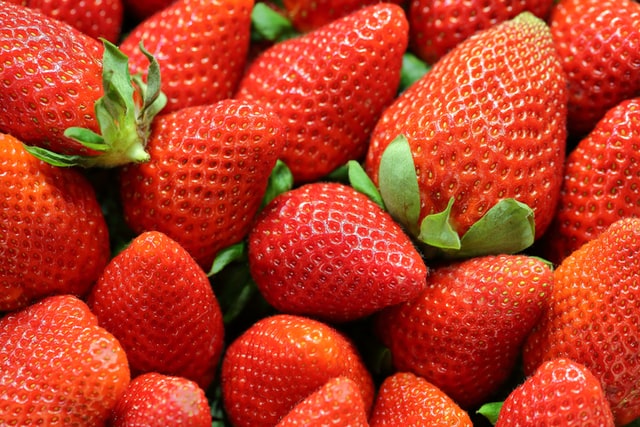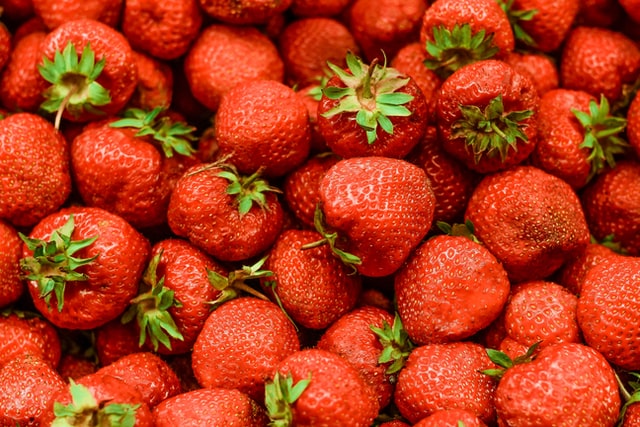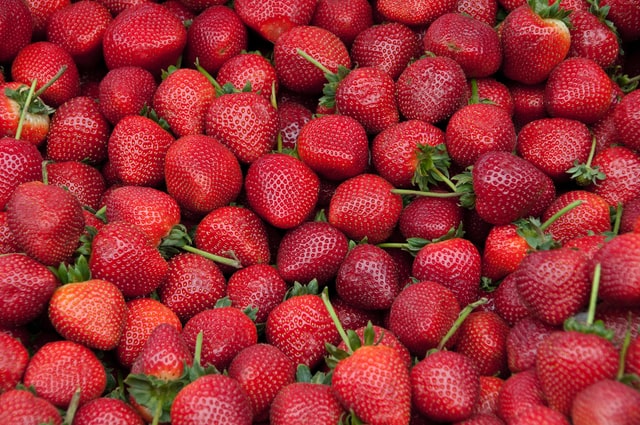
For people with diabetes, it can sometimes be a difficult decision as to what they should eat. There are so many foods that can have different reactions to the glucose levels in the blood and choosing the foods that work together to create the best performance for your body is what is key to being as healthy as one can be when you have Diabetes.
Strawberries are one food that is always questioned. Although it is a fruit, it also has natural sugar in it. However, strawberries are also considered to be a slow-release carbohydrate, which means that strawberries will not create a glucose spike or drop when they have been eaten.
Benefits

The natural goodness of a strawberry is one of nature’s treats. It is sweet enough to not need any added sugar, it is juicy and obviously, it does taste good. There are actually other benefits when it comes to strawberries.
First off, they are loaded with antioxidants, vitamins, minerals and also fibre. Strawberries can play an important role in a healthy diet, along with an exercise routine and following the medical recommendations offered.
Strawberries have a GI of 41, we know that it is highly important for Diabetics to choose foods that are low in the GI count.
Strawberries are rich in antioxidants which help to fight disease and boost insulin sensitivity. The fruit is also rich in fibre, potassium, vitamins and folate. Vitamin C boosts the immune system, while folate helps with normal tissue growth.
When it comes to diabetes, strawberries contain a slow-release carbohydrate that does not cause a spike in your blood sugar after eating. Rather, this slow release helps to manage the blood sugar instead.
With the glucose index at 41, which is below the standard 55, the strawberry is considered universally a low GI food. This simply means that the amount of sugar in the strawberry will not affect your glucose levels.
Adding Strawberries

Strawberries are actually a very versatile fruit. They can be added to each meal with no issue in taste, or flavour.
For breakfast, they can be added to yoghurt or oatmeal to give a great boost of flavour.
At lunchtime, they can be tossed on a salad for a burst of colour and added flavour.
Dinner time can see them on salads, topping a scoop of cottage cheese or simply eaten as a snack afterwards.
Strawberries can be added to virtually any dessert to give an extra punch of flavour with no added sugars.
Limits

So how many strawberries can a diabetic have daily? How do you count these if they have been added to other foods or mixed in previously? In one way, it can be looked at as since the strawberry is a slow-release carbohydrate, it is safe to assume the amount is not an exact count or measurement.
If you were to sit down and eat them plain, then it is recommended that you eat no more than 8 strawberries a day. The equivalent of this chopped or cut-up would be roughly 1 ½ cups of strawberries a day.
Risks

Obviously, like all foods, there are some risks possible. When you eat too many strawberries, whether you are diabetic or not, there is a chance of stomach upset, diarrhoea, bloating, heartburn or even acid reflux.
However, remember that the benefits of eating strawberries will far outweigh the risks each and every time. Other benefits for Diabetics include that anthocyanin may help to improve heart health. Strawberries can help in weight management or weight loss. This is due to strawberries being low in sugar and also low in carbohydrates.
The fibre in strawberries helps maintain regularity in bowel movements. The anti-inflammatory and antioxidant properties found in strawberries aid in the repair of tissue and also help with the treatment of arthritis. Some research does show that eating strawberries may help to reduce the risk of some types of cancers, and some obesity-related diseases.
It is common knowledge that when you can find a fruit that is low in sugar, it is a good substitute for other treats or snacks you may want to grab. This means that by keeping a supply of strawberries in your refrigerator, you would be able to grab one or two of them and munch. These two simple snacks will stop the nagging sweet tooth cravings, this helps to prevent those cravings for other treats like cookies, cake or chocolates and other candies.
This makes it a safe swap and probably a way to help maintain or lose some weight as needed. This can bring us to a further warning that must be given. When you come across desserts that have strawberries in them, this does not mean that the dessert is healthier due to the strawberries. This is not the case. Any dessert must be eaten in moderation due to the carbohydrates and sugar content.
This is no different from stating a dessert with dark chocolate is healthier than milk chocolate. Whether chocolate is used, you still need to eat the food in moderation. The strawberries may be an added benefit to your health, however, not enough to make up for the amount of sugar or carbohydrates in the remaining desserts.
Strawberries may help to maintain healthy glucose levels. They are also safe to eat every day for a Diabetic. As long as the limit is followed and moderation given to the amount you can eat.
When strawberries are added to other foods, there should be a record of how much total was added to the recipe. Most medical professionals would tell you to not add the Strawberries until right before you plan to eat the food. It is only by doing it this way that you can monitor the amounts you are eating each day.
There is no clear determination as to why some people get diabetes and others don’t. Some do insist that being overweight may have a lot to do with it. Family history and also pre-diabetics have a higher risk of having Diabetes. Fruit does contain natural sugar, however, it is unlikely that it would harm your health when eaten as a part of a healthy diet.
The natural sugars in fruit make a perfect substitution for artificial sugars or granulated sugar. Adding strawberries to a part of the daily diet is good. There is, however, the same risk of eating too much fruit. Even natural sugar can increase the glucose level in the blood. This is why they give recommendations as to how much to eat per day. When a person purposely eats more of any item, this can cause higher glucose levels and lead to other issues.
These limits can also pertain to those who do not have Diabetes 1 or 2. It all plays into the old adage of ‘Too much of a good thing”. Another warning that should be heard is that dried fruit is no healthier than fresh fruit. It is actually higher in sugars than fresh fruit. That would mean that it is dangerous for anyone who has diabetes to begin using dried fruit as a snack, thinking it is healthy. The dried fruit is going to cause some serious spikes in the glucose blood levels.
For those without diabetes, this can cause weight gain, dental issues and yes, even sugar spikes for them.
For those who exercise the amounts of fruit such as strawberries that can be eaten may vary. This is part of what should be an ongoing conversation between the Diabetic patient and their medical care team. It may be determined that with exercise the patient may be able to eat more than the suggested amount of strawberries.
Conclusion

Diabetes never goes away, however, it is believed that it may be reversed enough to require less medication than the person is currently using. This is in no way stating that your diabetes will vanish and you will not need medication.
Your blood glucose levels may eventually return to a prediabetic level, however, your diabetes will always remain with you. The amount of your medication may be reduced, however, you will always need to be aware of what you eat, how much you eat and how much you exercise.
The body and how the systems work is a mysterious things. Not all issues come with answers that are definitive. The best the diabetic could do is to eat a healthy diet as laid out by the Registered Dietician and follow the recommendations that are set forth by your Medical Care team.
If you have questions, be sure to contact a professional who can answer those questions. Quite simply, when a person is responsible and takes control over their own life and health, eat a healthy meal plan, exercise regularly and follow all other suggestions and information that the team gives you.
Although it may seem like Diabetes controls you due to all the foods you can not eat, you actually have control over your diabetes, because you and only you control what foods you eat and how much of those foods you eat.





